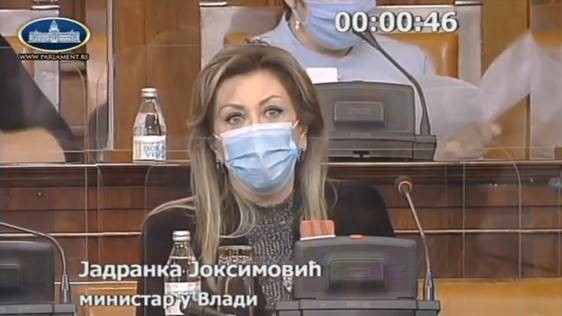
Responding today to the criticism of MP Enis Imamović, Minister of European Integration Jadranka Joksimović said that he had misinterpreted the European integration process as a specific instrument in exercising the needs of a part of a minority community that he represented.
At the session of the Assembly dedicated to the discussion of conclusions from the EC 2020 Progress Report on Serbia, Joksimović underlined that the European integration process was an umbrella intersectoral policy, a task for each member of the Government, for each MP and every institution within the system and not a one-way process.
“We are not only aligning with the Union, but the EU itself also has to agree with a country’s membership and to allocate budget funds for that”, Joksimović said.
European integration refers to the society as a whole, Joksimović has said, adding that this is a process where everyone has a role, regretting that MP Imamović sees himself exclusively through a prism of national minority and sees the EC Report and the European integration process only as a specific instrument for exercising specific and particular interests.
She emphasised that year 2020 proved that European integration topic is no longer speed or distance but rather the depth of sustainability of changes that will make the entire EU and all European countries more sustainable, from economic, health and sustainable development aspect.
Joksimović elaborated that these were the reasons why the EU enacted the Green Agenda and digitisation as new elements of European growth and sustainability.
“I regret that there are so many divisions even between the minority communities in Serbia, among other the Bosniak one, because sustainability is not founded on differences but rather on joint and focused efforts, so I believe that we should understand this process in a proper way. This process will help us get into the tracks of changes and sustainable development with the rest of Europe“, Joksimović has said.
Regarding national minority rights, Joksimović has recalled the Action plan within Chapter 23, which is now a part of cluster 1 – fundamental rights, where Serbia has opened all five chapters.
In 2016 in Serbia, she has said it was estimated that it would be good to adopt a special action plan that was not known in any acceding country, adding that this was to Serbia’s advantage.
She has underlined that Serbia is a signatory of all conventions on human rights and that it is, in the legislative and factual sense, above many European countries.
“This is noted in all reports, particularly since 2016“, Joksimović has said.
What is not right, the Minister has said, is the promotion of collective national rights since there are no collective national rights, and this is contrary to European values that recognise only and exclusively human rights and liberties, including the rights of all minorities and not only national ones.
“Do not talk about the idea contrary to European spirit, about collective minority rights, because that does not exist”, Joksimović has said to Imamović, stating that many EU member states do not even recognise the category of national minorities, which she deems as not good and which is reflected on some processes within the EU and to accession processes of some countries that should have launched negotiations but did not – North Macedonia and Albania.
She has said to Imamović that the Report and SAA are important instruments which measure the process of association in one part, but the process is much broader – it is an umbrella intersectoral sustainability policy.
As she has said, the debate whether Serbia is for or against the EU membership is outdated; it should be discussed how to achieve sustainability in Europe jointly and what is the best way for the old continent to overcome the crisis alike the one from this year.
She has recalled that this is why the EU enacted an incentive investment plan for the Western Balkans where large funds are allocated for us to harmonise with the Green and Digital Agenda as new economic policies of economically sustainable development.
Regarding the national minority councils, Joksimović has emphasised that the councils are not local self-administration bodies as the MP interpreted the Council’s role.
She has emphasised that it is necessary to precisely and clearly define the role and manner of work, which was done by Serbia in the best possible way; in this segment, no backsliding has been noted for three reports in a row, on the contrary – legislative framework and the overall practice have been commended.
Replying to Minister Joksimović, Imamović said that he focused on minority rights since he was a member of minority in the Assembly and was elected on a minority list.
“Members of Bosniak people elected me to represented their interests in the Assembly, and if the interests of Bosniak people in this Assembly are to indicate the EC report stating that Bosniaks are discriminated in certain areas, I will use my right and possibility to indicate such issues“, Imamović has said.
Joksimović has responded to Imamović on that as well, although he left the Assembly hall, and told him that he carried the burden of proof since he stated the facts that were not true.
“Citizens need to hear the truth from this place, or at least accurate facts; and it is up to citizens themselves to interpret the facts as they find fit“, Joksimović has said.
Responding to Imamović’s remark that language and culture are collective rights, Joksimović has said that they are not, but rather an element of the protected status of national minorities instead of right.
Source: Tanjug





